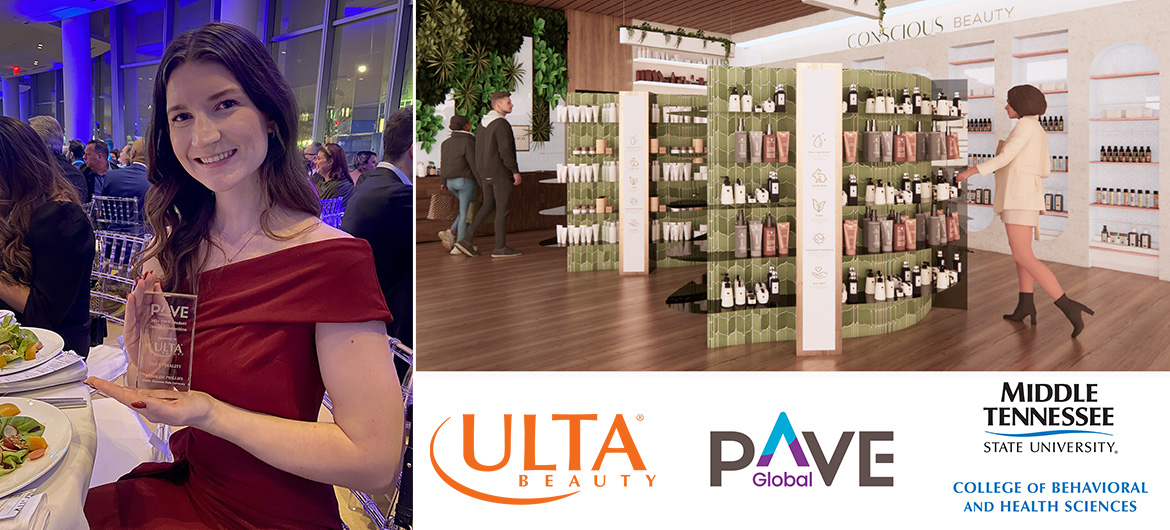
Interior Architecture
Turn your creativity into a career with an accredited interior architecture program for residential, commercial, and innovative design.
Interior Architecture, B.S.
Earn your bachelor's degree in Interior Architecture through the College of Behavioral and Health Sciences at MTSU.
Want to learn how to turn your passion for creative design into a career? When you're in a space, do you take notice of your surroundings and think of ways to make it better? The interior design program at MTSU offers the skills and knowledge you need to connect people to the spaces where they live, work, learn, and play. Interior architects create residential and commercial spaces that protect and enhance the health, safety, welfare, and well-being of the public. From proper lighting to ergonomics, studying Interior Architecture can open up a world of opportunities for those with creative minds.
Interior Architecture Degree Accreditation
The Interior Architecture curriculum meets the requirements for Allied membership in the American Society of Interior Designers and Affiliate membership in the International Interior Design Association. Accredited by the Council for Interior Design Accreditation (www.accredit-id.org), the B.S. degree offers preparation for entry-level positions in residential and contract design firms, sales, design consulting, computer-aided design, and other related design areas. The program includes a major in Interior Architecture and a professional core in Human Sciences, art, and business.
The Interior Architecture Program leading to the Bachelor of Science (B.S.) degree in Interior Architecture is accredited by the Council for Interior Design Accreditation, 206 Grandville Avenue, Suite 350, Grand Rapids, MI 49503. The CIDA-accredited program prepares students for entry-level interior design practice, for advanced study, and to apply for membership in professional interior design organizations. The Bachelor of Science (B.S.) degree in Interior Architecture granted by Middle Tennessee State University meets the educational requirement for eligibility to sit for the National Council for Interior Design Qualification Examination (NCIDQ Exam). For more information about NCIDQ Exam eligibility visit: https://www.cidq.org/eligibility-requirements. This program is eligible for the Academic Common Market.
Middle Tennessee State University is accredited by Council for Interior Design Accreditation (www.accredit-id.org) and The National Association of Schools of Art & Design.
Interior Architecture Degree Student Achievement Data
2023/2024 Student Achievement Data
Study Abroad Opportunities
- INVTUR Conference and ProGlobe Summer Camp, Portugal, May 2024 Participants and Grant Recipients: Emma Bauer, Victoria Platt, Erin Vineyard
- ProGlobe and Design Thinking Summer Camp, Germany, May 2023 Participants and Grant Recipients: Meret Girgis, Mahala Owen, Jorden Johnson, Jacob Davis
- ViMoAll Conference, Germany, May 2023 Participants and Grant Recipients: Meret Girgis, Mahala Owen, Jorden Johnson
- Abigail Senadenos awarded the U.S. Department of State’s Benjamin A. Gilman International Scholarship
- Study Abroad Argentina
Virtual and In-Person Exchanges
- 2019-2024: ProGlobe International Project and Conference; ProGlobe - Consortium of Virtual Exchange (cove.education); About - Consortium of Virtual Exchange (cove.education)
- 2019-Bryce Massey, Berlin
- 2020-American Society of Interior Designers (ASID)-Scale Conference-Seattle, Washington-Lauren Schrimsher, Rachel Whorton, Aubree Davis
- 2020-American Society of Interior Designers (ASID)-Scale Conference-Seattle, Washington-Lauren Schrimsher, Rachel Whorton, Aubree Davis
- 2021-International Virtual Exchange Conference (IVEC), Newcastle, UK: Lauren Schrimsher panelist and presenter.
- 2022-The Network of Executive Women in Hospitality (NEWH) Conference, Student officers: Hope Weaver, Dakota Sokoloski, Tayler Beale, Mahala Owen, Luka Arnautovic, Makayla Morrical
If you live in one of these states: DE; you may be able to attend MTSU at in-state rates under the Academic Common Market program.
News Briefs

MTSU interior architecture student earns top honors in international design competition
Middle Tennessee State University interior architecture major Annalise Phillips of Nolensville earned top honors at the 29th annualPlanning and Visual Educational Partnership, or PAVE, International Student Design Competition.[ Read More ]

MTSU interior architecture professor part of international team to win European Union award for global project
Middle Tennessee State University Interior Architecture professor Kristi Julian is part of a five-country team of college educators who received a prestigious European Union award for a student-focused globally connected digital project.[ Read More ]
News Briefs

MTSU interior architecture student earns top honors in international design competition
Middle Tennessee State University interior architecture major Annalise Phillips of Nolensville earned top honors at the 29th annualPlanning and Visual Educational Partnership, or PAVE, International Student Design Competition.[ Read More ]

MTSU interior architecture professor part of international team to win European Union award for global project
Middle Tennessee State University Interior Architecture professor Kristi Julian is part of a five-country team of college educators who received a prestigious European Union award for a student-focused globally connected digital project.[ Read More ]
Related Media

Interior Architecture, B.S.
Katie Vance Named MTSU 2022-2023 Distinguished Alumnus
One of the top designers of Nashville’s booming restaurant and hospitality scene, Vance’s work includes Butcher and Bee, Butchertown Hall, The Green Pheasant, The Russell Hotel, The Cordelle and many more. At Powell Architecture, she runs the interior design department, plus the firm’s marketing and social media endeavors.
Vance founded Porter Flea, a well-known handmade modern craft market, to propel Nashville’s independent craft and design scene. She is a 2021 recipient of the Nashville Business Journal’s 40 Under 40 award. Her work has earned praise from regional and national publications, including Garden & Gun, Architectural Digest, Domino, Dwell and Southern Living. She has served on many juries for the MTSU Interior Design Program midterm and final reviews.

Interior Design Hosts a Series of 30 Under 30 Events
Recently, Paige Jenkins, Class of 2016, received recognition as one of the top 30 Atlanta future design leaders. Interior Design magazine started the awards in New York City, Chicago, and Dallas and added Atlanta this year.
Interior Design is an established international publication on contract and residential interior design. Annually, they publish the list of the Interior Design Giants, which is a benchmark for designers and students to understand design excellence. Their new initiative called 30-under-30 (30/30) honors the work of early career creatives nominated by the senior management of established firms in each city.
Paige is an Associate Designer with HLGstudio. Previously, she worked at Atlanta firms Nelson Worldwide and Dana Lynch Design Ltd. She specializes in multi-family housing and works on various firm projects using her diverse skillset. She loves her work and occasionally works with fellow 2016 graduate, Marcus Byers, on projects. Paige reports that since her recognition as an Atlanta 30/30, she has connected with a broader range of firms, designers, and opportunities. We look forward to watching Paige’s career successes!
Recognition by Firm
https://www.instagram.com/p/CqA2RWUOnFz/

Professional Licensure Disclosure
The Bachelor of Science (B.S.) degree in Interior Design at Middle Tennessee State University (MTSU) is accredited by the Council for Interior Design Accreditation (CIDA) and meets the educational requirement for eligibility to sit for the National Council for Interior Design Qualification Examination (NCIDQ Exam). For more information about NCIDQ Exam eligibility visit: https://www.cidq.org/eligibility-requirements. Meeting CIDQ’s work experience requirements does not guarantee a candidate will meet their local jurisdiction’s requirements to be a licensed, certified, registered interior designer. Currently the state of Tennessee does not require state licensure or certification. https://www.tn.gov/commerce/licensing-regulations.html MTSU cannot confirm whether this program will meet all of the requirements of another U.S. state or territory that requires a state license. Students should be aware that licensure requirements vary from state to state and are subject to change and consult with the licensing board for each state. Check local jurisdiction for requirements.
Interior Architecture Careers
Because career preparation integrates into all areas of the MTSU Interior Architecture student experience, your journey toward professional life begins the moment you step on campus. MTSU Interior Architecture faculty are practitioners and educators dedicated to providing graduates with the skills and experiences needed to flourish in a profession that is vital to the health, safety, and happiness of people around the world. Interior architects are responsible for making sure that everything that influences the function and perception of a space is effective. From hospitals and offices to housing and retail, interior architects ensure that interior spaces meet the needs of both the building’s owner and its users. The program has an extensive network of local and global firms which support professional experiences through industry-engaged studios, internships, and a variety of industry and program sponsored programming that connects students to professionals.

MTSU’s Career Development Center
MTSU offers a comprehensive Career Development Center that serves students throughout the full student experience and beyond. They collaborate with faculty and staff to equip students with the tools to be marketable to the world of work and continuing education.
Students can schedule an appointment or check online resources and job boards at mtsu.edu/career.
Students can find current internship opportunities by talking to faculty and visiting the University job and internship board called Handshake.
Wondering what you can do with your major? Check out our What Can I Do with A Major In guides.



Professional Licensure Disclosure
The Bachelor of Science in Interior Architecture (BS Interior Architecture) in the College of Behavioral and Health Sciences is accredited by the Council for Interior Design Accreditation (CIDA). Admission to the BS Interior Architecture does not guarantee that students will pass the National Council for Interior Design Qualification Examination (NCIDQ Examination) or obtain licensure, certification, or registration. Currently, Tennessee does not issue a license for interior design; however, the state does require an earned degree in interior design accredited by CIDA and passage of the NCIDQ Examination in order to apply to use the title “Registered Interior Designer.” Successful completion of the 120-semester hour BS Interior Architecture meets these educational requirements.
Licensing authorities for each state set and enforce their own requirements and standards, which are subject to change. The BS Interior Architecture disclosure provided on MTSU’s professional licensure disclosure website indicates the states and territories where MTSU has determined, through reasonable and good faith effort, that the program does or does not meet the educational requirements for other US states and territories.
Current and prospective students not located in Tennessee or who plan to seek licensure or certification outside the state of Tennessee should contact the appropriate state licensing agency or board and discuss their plans with an advisor before enrolling in the program to ensure they have the most up-to-date information and guidance regarding licensure requirements.
Interior Architecture Degree Accreditation
The Interior Architecture Program leading to the Bachelor of Science (B.S.) degree in Interior Architecture is accredited by the Council for Interior Design Accreditation, www.accredit-id.org, 206 Grandville Avenue, Suite 350, Grand Rapids, MI 49503. Speak with an advisor today: Bonnie McCarty - [email protected]
Interior Architecture Mission
The mission of the Interior Architecture program at Middle Tennessee State University is to provide an experiential educational program that prepares graduates for entry-level positions in the field in addition to life long and academic learning. The experiential curriculum prepares student to successfully engage in an evolving profession influenced by globalization, human needs, and technology.
Interior Architecture Philosophy
The Interior Architecture program’s educational philosophy supports the mission and goals by providing a student-centered, experiential learning environment. The focus is on preparing students through project and problem based learning wherein students use independent and critical thinking, content knowledge, and creativity to address human/built environment issues. Faculty serve as guides and facilitators in assisting students in reaching their full potential.
Goals
- Think critically to identify and solve problems
- Communicate verbally, visually, and in writing
- Address human condition via design, health, safety, welfare
- Use content knowledge to develop creative solutions
- Conduct themselves in an ethical manner
Advisor Information
Bonnie McCarty – [email protected]
Resources
- Professional Organizations
- Program Events
- Interior Design Registration, TN
- Council for Interior Design Accreditation (CIDA)
- 2024 Student Handbook
Articles
- MTSU News articles about Interior Design program
- ’MTSU On the Record’ highlights projects on slave economy, virtual collaboration
Highlights
Benjamin A. Gilman International Scholarship Awarded to Abigail Senadenos
Abigail Senadenos earned the U.S. Department of State’s Benjamin A. Gilman International Scholarship. This scholarship is a grant program that enables students of limited financial means to study or intern abroad, thereby gaining skills critical to our national security and economic competitiveness. Abigail was one of only two recipients for MTSU who received this prestigious award.

Senior interior design student Jorden Johnson, Fall 2023 URECA award recipient, will present at this year’s National Council for Undergraduate Research conference in Long Beach, California in April. The title of her presentation is “Assessing the Fidelity of Illuminating Engineering Society (IES) Profiles in Architectural Lighting Simulations: A Comparative Analysis.” Jaimie Burriss takes a group photo with all presenters each year that we could add later if needed.
Senior interior design student Kelsie Davy appeared in the Daily News Journal about her Formica project fabrication and presentation at Inspire 2023. https://www.dnj.com/story/news/local/schools/mtsu/2023/11/06/mtsu-mondays-interior-design-honored-online-offerings-doubled/71411982007/
MTSU’s Julian honored with interior design Volunteer Excellence Award
Middle Tennessee State University professor and Interior Design Program Director Kristi Julian has been honored with the 2022 Keith Hooks Volunteer Excellence Award in recognition. Read more.

Simulation Collaboration
The purpose of this project simulation is to provide experiential learning and determine the effectiveness of the classroom simulation event as a teaching tool to improve understanding of the needs of older disabled adults or live “events”. These yearly simulations address and measure how well basic human needs are met and focuses on providing an environment conducive to individual and family well-being. They demonstrate how the built environment contributes to the common good, and a shared moral/ethical culture is transmitted from generation to generation. They also demonstrate generational life span and life course development within the eco-systems theory (ecological framework) as the professional focuses on the well-being of individuals and families and the communities in which they live.

Dismas House and Doors of Hope
For the Dismas House/Doors of Hope Project, social justice, cultural emphasis and economic diversity were all addressed with the student research referenced CAPSA. For the Domestic Violence Center project student project solutions addressed domestic violence, sexual abuse, and rape recovery. Student generated research, program booklets discussed how to design support centers and physical environments for women, men, and children impacted by abuse. Process sketches, notes and design analyses discussed how these types of facilities must be designed to not only provide a safe place for victims, but the interior environment must heal its occupants.
Student work noted the importance of support for victims of domestic violence and sexual assault and how to reduce incidents of abuse through prevention education. Solutions also discussed the cognitive changes and interpersonal relationships of women who have suffered from domestic abuse and how cultural, economic and ecological contexts informed their design. This project demonstrates how the built environment may contribute to the common good, and a shared moral/ethical culture is transmitted from generation to generation. Communities foster a sense of well-being of individuals and families and often turn groups of people into social clusters that resemble extended families.



CONTACT US











